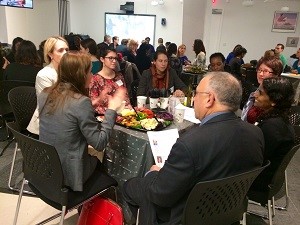Gender knowledge cafes: A technique to improve gender integration practices
By Elizabeth Romanoff Silva on November 13, 2014

Through the USAID Applying Science to Strengthen and Improve Systems (ASSIST) Project, of which WI-HER LLC is a partner, we utilize knowledge cafes as a technique for stimulating the synthesis of knowledge among our improvement teams. I recently had the pleasure of applying the knowledge café model we use through the USAID ASSIST Project to gender integration by facilitating a Gender Knowledge Café at an event hosted by Creative Associates in collaboration with the Washington DC Gender and Development Networking Group. The event brought together DC’s most experienced gender and development professionals, together with those just entering a career in gender, to discuss their career paths and exciting developments in the field.
The event began with a panel discussion which was followed by an interactive knowledge café. Using the USAID ASSIST knowledge café model, the exercise was designed to generate knowledge about the needs and actions required for gender practitioners to be most effective at the individual level – whether just entering the field or seasoned practitioners – and as a community of practitioners. This included discussing tools, capacity building, skill sets and resources, as well as sharing experiences of what works and what does not, and overcoming challenges. Nine table hosts facilitated small group conversations with over 90 participants. Table hosts represented a diverse group of gender and development practitioners, including gender advisors from USAID, the Asia Foundation, ICRW, the State Department, and Counterpart International. USAID ASSIST Gender Technical Advisor Dr. Taroub Faramand, President of WI-HER LLC served as a table host and shared our ASSIST improvement approach to integrate gender and address gender issues.
Four critical factors combined to make the knowledge café a success. First, a discussion question was placed at each table, to drive the discussion around meaningful questions. Second was the act of rotating “cafes,” or tables, to allow for the cross-pollination of ideas. Groups were in such deep conversation that it was challenging to interrupt and invite participants to change groups, but it was worthwhile as it provided participants an opportunity to share their experiences and discuss important topics with a variety of people. The third point that led to the effectiveness of the session was the room set up: a mix of high and low circular tables and even a few couches pushed in a circle, and appetizers placed on each table promoted a friendly, collaborative environment for participants to get to know each other and to share ideas.
The final factor that made the knowledge café highly successful was bringing the small groups together to debrief as a large group to share takeaways and insights at the end of the knowledge café session. This allowed for the synthesis of knowledge that was created during the session.
My biggest takeaway from the event was that there is a need to promote ongoing knowledge sharing and collaboration among gender practitioners, to discuss important topics and to learn from one another. This will lead to improved gender integration practices. The gender knowledge café was a huge success, and it was a testament to the reach and adaptability of the techniques for integrating and synthesizing knowledge and sharing learning utilized by the USAID ASSIST Project.